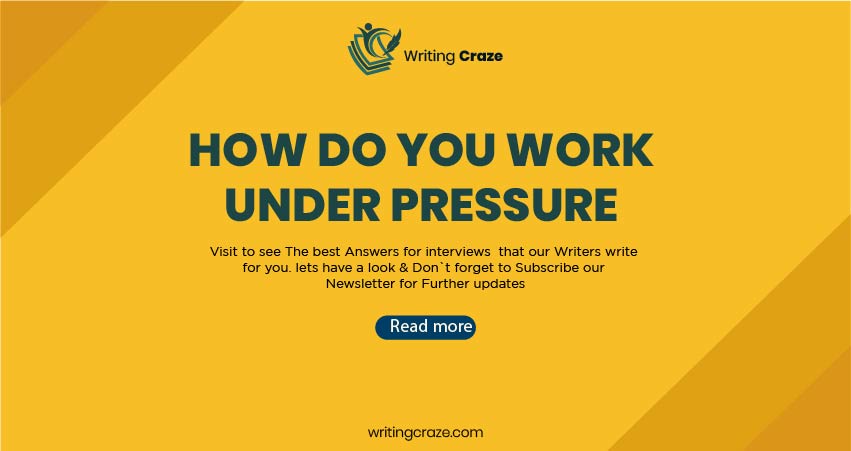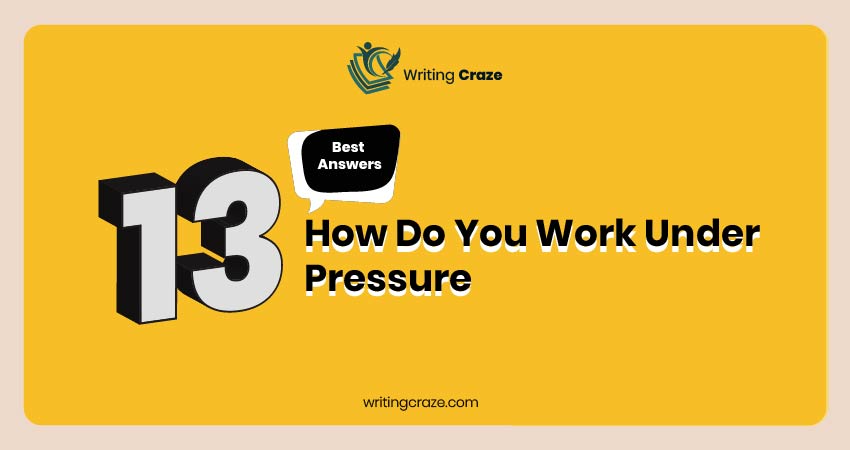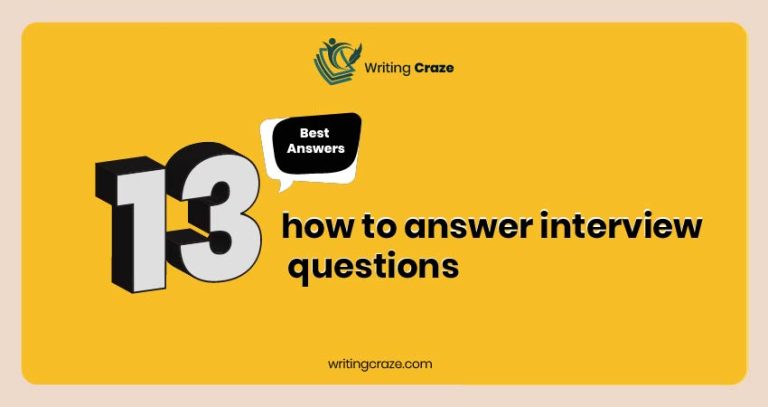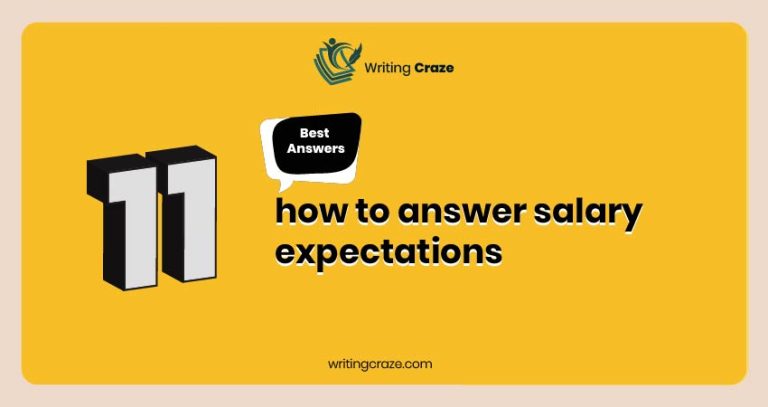How Do You Work Under Pressure [11 Samples]
Do you work well under pressure? It’s a question that has been asked of many people, especially during interview and there is no one-size-fits-all answer. Some thrive under pressure, while others crumble. What works for one person might not work for another. And what works today might not work tomorrow. How do you work under pressure? Check out these 13 examples to see how to answer this difficult question who knows, you might find some inspiration for your own approach!
5 Most Demanding Interview Questions
Job interviews can be a nerve-wracking experience, even for the most experienced candidates. If you’re well prepared, however, you can enter the interview confidently and come out with a job offer. In addition to knowing your resume inside and out, it’s also important to be ready to answer some of the most common (and difficult) interview questions. Here are five of the most demanding questions you may be asked, along with some tips on how to answer them effectively.
- “What are your strengths and weaknesses?
- “Why do you want this job?
- “Where do you see yourself in five years?
- “What are your salary expectations?”
- “Do you have any questions for me?
Asking tough questions like these can help an interviewer get a better sense of who you are as a professional and whether or not you’d be a good fit for the job. If you enter an interview feeling confident and prepared, you’ll be more likely to impress employers and land the job offer.

How do You Work Under Pressure
When an interviewer asks how you work under pressure, they’re trying to gauge your ability to handle stress and remain calm in difficult situations. There are a few key points that you’ll want to hit in your response in order to demonstrate that you’re able to work well under pressure.
First, highlight a time when you were able to effectively manage a high-pressure situation. This could be a project at work that had a tight deadline, or a personal challenge that required you to stay calm and focused. Next, emphasize your ability to stay calm and level-headed when things are getting hectic. This is an important skill in any workplace, and it’s one that interviewer will be looking for. By showing that you have a plan for dealing with pressure, you’ll give the interviewer even more confidence in your ability to thrive under difficult conditions.
Answer Example 1:
When I’m under pressure, the first thing I do is take a deep breath and try to stay calm. I remind myself that panicking won’t help and that I need to focus on the task at hand. Once I’ve settled down, I assess the situation and figure out what needs to be done.
From there, I develop a plan of action and start working. I find that breaking the task down into smaller steps helps me to stay focused and avoid getting overwhelmed. As I work, I periodically check my progress to make sure I’m on track. If I start to feel overwhelmed again, I take another deep breath and remind myself that I can do this.
Answer Example 2:
For me It depends on the pressure. Some types of pressure are helpful and motivating, while others can be overwhelming and debilitating. The key is to learn how to work under different types of pressure, & I believe I have ability to work under pressure easily.
How do you Work Under Pressure Example Answer
Working under pressure can be challenging, but there are some things you can do to make it easier. First, try to stay calm and focused. If you start to feel overwhelmed, take a few deep breaths and remind yourself that you can handle the situation. It can also be helpful to break the task down into smaller steps so that you don’t feel like you have to do everything at once.
Take a few minutes to plan your work, and then focus on one step at a time. Additionally, try to set realistic goals for yourself and give yourself regular breaks so that you don’t get too frustrated or exhausted. By taking these steps, you can make working under pressure much more manageable.
Answer Example 1:
There’s no doubt that working under pressure can be tough. But there are some things that I do and that helps me to make the process a little bit easier and work effectively under pressure:
- Make a plan.
- Breaking down your tasks into smaller ones.
- Take breaks. It’s important to give myself time to relax and de-stress when I am working under pressure.
Answer Example 2:
It’s important to stay focused when under pressure and not let distractions get in the way. I can do this by keeping a clear goal in mind and focusing on the task at hand. It’s also helpful to maintain a positive attitude, even if things are going wrong. This will help keep me calm and motivated. Lastly, taking deep breaths also help relax my body and focus my mind.
How well do you Work Under Pressure
Answer Example 1:
I work very well under pressure. I thrive in high-stress environments and enjoy the challenge of meeting deadlines. So, I usually manage to stay calm and focused under pressure, but there are times when I do feel a bit overwhelmed. In those cases, it’s important for me to take a few deep breaths and stay positive. I know that things will eventually work out, and that’s usually enough for me to get back on track.
Answer Example 2:
I work pretty well under pressure, to be honest. I’m the type of person who likes to have a lot on my plate and feels motivated when I have deadlines looming. Of course, there are certain types of pressure that can be difficult to manage (like last-minute changes or unexpected challenges), but in general, I’ve found that I’m able to stay calm and focus when there’s a lot riding on a particular task.
How do you Handle Stress and Pressure at Work?
Everyone has different limits when it comes to handling pressure. Some people thrive under pressure and feel like they perform their best when the stakes are high. Others crumble under pressure and find that it negatively impacts their work. There isn’t necessarily a right or wrong answer – it’s all about knowing your own limits and working within them.
There are a few things you can do to see how well you work under pressure. One is to experiment with different types of pressures in different areas of your life. For instance, you might set a personal fitness goal for yourself and see how well you stay on track when the going gets tough. Or, you might take on a challenging project at work and see how well you’re able to maintain your quality
Answer Example 1:
I work well under pressure because I am able to stay calm and focused in challenging situations. I have good time management skills and I am able to prioritize my tasks so that I can complete them efficiently. So. I am also a good problem solver, so if there are any challenges that arise, I am able to quickly find a solution.
Answer Example 2:
I have a positive attitude and I am able to stay motivated even when things are tough. Overall, working under pressure is not a problem for me because I have the skills and the mindset necessary to succeed.
How do you Work Under Pressure Example Answer for Freshers?
There are a few things you can do to help manage and cope with working under pressure. First, it’s important to try to stay calm and focused. If you feel yourself getting tense or frazzled, take a few deep breaths and allow yourself a moment to regroup. Secondly, prioritize your tasks and charity the most urgent or important ones first. This will help you to stay on track and avoid getting overwhelmed. Lastly, make sure to take breaks when you need them. It’s not productive to try to push through when you’re feeling exhausted or burnt out – instead, take some time for yourself so that you can come back refreshed and ready to tackle whatever is thrown your way.
Answer Example 1:
I usually work well under pressure, but I know that it’s not for everyone. I think it’s important to learn how to deal with pressure in a healthy way so that you can stay focused and productive under stress. Some ways to deal with pressure include taking breaks, deep breathing exercises, and visualization techniques.
Answer Example 2:
I work well under pressure. I’ve learned to stay calm and focused when things get hectic. I thrive in high-stress environments and feel more productive when I’m working under pressure. I know how to stay organized and keep my priorities straight, so I can get the job done even under difficult circumstances.
Answer Example 3:
I’m usually able to maintain my composure even when things are chaotic, and I have a lot of experience dealing with last-minute changes and unexpected challenges. I’m confident that I can handle whatever comes my way, no matter how stressful it may be.
Conclusion
Pressure is a natural part of life. How we deal with it is what differentiates successful people from the rest. The tips we shared in this blog post should help you answer interview questions about how you work under pressure and give potential employers an idea of how you handle stress. I hope you found this blog helpful and feel more confident going into your next interview.








